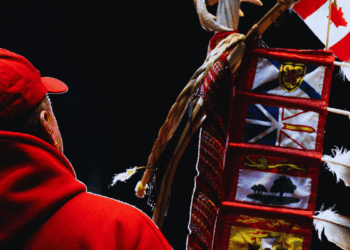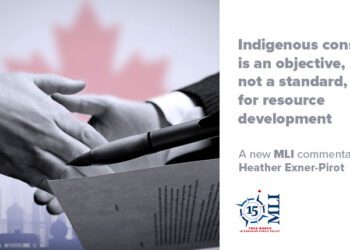On Tuesday, April 6, Environics released its Urban Aboriginal Peoples Study (UAPS), a long awaited and much needed study of the Aboriginals living in Canadian cities. As of 2006, half of the Aboriginal population lived in Canadian cities, yet prior to this report, very little was known about their experiences and perspectives on Canadian life. By interviewing thousands of urban Aboriginals living in 11 Canadian cities, the UAPS has filled an important gap in our understanding of the life prospects for Canadian Aboriginals.
The findings are telling. Although urban Aboriginals retain a “strong sense of connection to their ancestral communities or places of origin,” a majority of urban Aboriginals consider their current urban residence to be their “home” (p.8). Urban Aboriginals want to become a part of their urban landscape; they enjoy living in cities as much as non-Aboriginals, and they still feel very connected to Aboriginal communities within their cities.
Like non-Aboriginals, urban Aboriginals aspire to the “good life”; they want a family, a balanced lifestyle, a good job and financial independence (p.8). Their “leading life aspiration,” according to the UAPS, is the pursuit of higher education. As the UAPS summarizes, “Not only do urban Aboriginal peoples see higher education as a path to a good job or career for their own generation, many say that they hope higher levels of education will be key to how future generations of Aboriginal peoples will distinguish themselves from their ancestors” (p.9). Those planning to pursue post-secondary education, of course, see higher education primarily as a way to advance their personal career prospects and quality of life. Yet those who have already completed pose-secondary education say “the greatest impact of higher education has been to help them feel more empowered – in part by expanding their knowledge of their Aboriginal heritage and identity” (p.9).
This important study should put to rest the fallacy that Aboriginals who move off reserve to pursue higher education and seek a better life for themselves and their families are abandoning their own culture and history. As the study notes, “Higher education emerges as a passport towards learning more about one’s Aboriginal identity – those urban Aboriginal peoples with a college or university education are more likely than others to claim a better understanding of their Aboriginal heritage and to believe this knowledge has contributed positively to their live” (p.9, emphasis added). For Aboriginals, post-secondary education offers more than the means to material well-being; it offers the opportunity to pursue a richer understanding of their culture and heritage.
Moreover, the study highlights a critical point that Calvin Helin and I noted in Free to Learn: the biggest obstacle to urban Aboriginals pursuing post-secondary education is funding. Urban Aboriginals who started but did not finish post-secondary education were less likely to have received financial support than those who finished post-secondary education.
In short, funding determines progress. Yet the barriers to funding are particularly acute for Aboriginals living off reserve. Under the current Post-Secondary Student Support Program (PSSSP), the federal government distributes $314 million annually to Indian bands across the country, who then distribute the funds to individual students. Although the money is intended for post-secondary education, due to a complete lack of oversight and accountability there is no information about which students are receiving funding, or how much funding they receive. Nepotism and favouritism abound as criteria for funding. And as our study (p.16) pointed out, off-reserve students, due in part to a lack of relationship with band leadership, are particularly prone to being unfunded.
Under our proposal, the PSSSP would be phased our, and replaced with an Aboriginal Post-Secondary Savings Account (APSSA) at birth for each Registered Indian student, regardless of whether they live on or off reserve. Upon graduation from high school, the accounts would contain at least $25,000 to be put toward post-secondary education. In addition to introducing fairness, transparency, and predictability into the system, the APSSA would rectify a problem highlighted by the UAPS study: It would ensure that all Registered Indians, including those living in urban areas, would have financial support necessary to pursue higher education.
We know that Aboriginals, particularly those living in urban areas, are not receiving the funding to which they are entitled. And now, thanks to this critical study, we know that the absence of funding is preventing urban Aboriginals from entering and completing post-secondary education, which is their “leading life aspiration.” Our proposal in Free to Learn outlines a way in which urban Aboriginals can begin receiving this funding immediately. The UAPS study underscores the fact that it is time for policymakers and Aboriginal organizations to take seriously the idea of Aboriginal Post-Secondary Savings Accounts.




